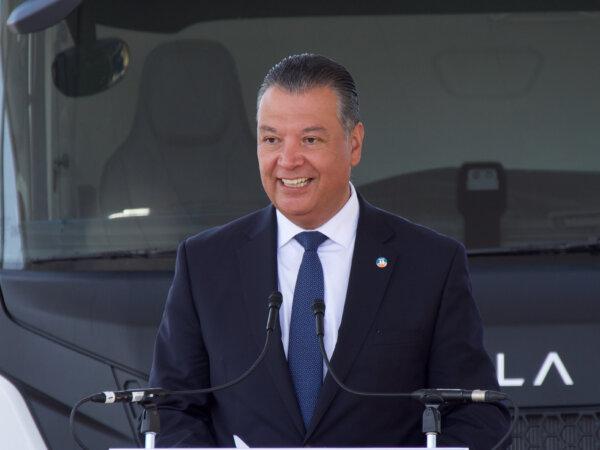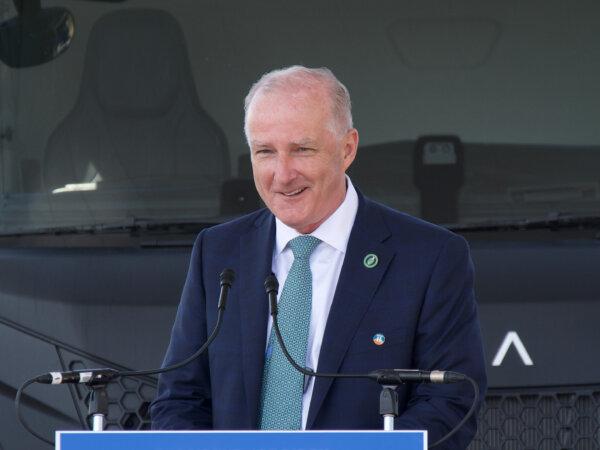OAKLAND, Calif.—Gov. Gavin Newsom joined U.S. Undersecretary of Energy David Crane, Sen. Alex Padilla (D-Calif.), and other state and federal leaders to announce the official launch of what officials say is the nation’s first commercial hydrogen fueling hub on Aug. 30.
“I’m ... proud of this great state,” Newsom said during the news conference. “We’re stepping up to advance our commitments.”
He quoted an African proverb as an inspiration for the teamwork that he said made the progress possible.
“If you want to go fast, go alone, but if you want to go far, go together,” Newsom said.
Established through a collaboration with hundreds of partners and funded by a $12.6 billion agreement—including $1.2 billion in federal funding secured in 2023 from the U.S. Department of Energy—the hub is part of a plan to develop and deploy hydrogen fuel projects with a goal of reducing pollution from diesel and gasoline fuel particulates.
Prioritizing heavy-duty trucking, public transportation, and port operations, the hub is intended to reduce carbon output by about 2 million metric tons per year—the equivalent of emissions from 445,000 traditionally fueled cars annually.
The decarbonization efforts target three ports across the state: Oakland, Los Angeles, and Long Beach. More than 5,000 hydrogen-fuel-cell electric trucks and more than 1,000 hydrogen-powered buses will be fueled by the hub—with infrastructure for hydrogen transport set to include 60 commercial fueling stations and 165 miles of pipelines.

A hydrogen-powered bus at a news conference celebrating investments in hydrogen fueling stations, in Oakland, Calif., on Aug. 30, 2024. (Travis Gillmore/The Epoch Times)
The hub is expected to create 220,000 new jobs—130,000 in construction and 90,000 permanent positions.
Over the summer, the world’s first fully hydrogen-powered ferry was launched in the Bay Area, and a hydrogen-electric flight successfully traveled 523 miles.
The senior senator from California said the hub follows through on promises made by the California Legislature in 2006 with the passage of Assembly Bill 32, which sought to address climate concerns.
“This is just another example of California’s longstanding, ambitious leadership and innovation when it comes to energy solutions,” Padilla said. “It’s also a chance today for the public to see the promise of California’s renewable, hydrogen future.”

Sen. Alex Padilla (D-Calif.) speaks at a news conference celebrating the launch of a commercial hydrogen fueling station in Oakland, Calif., on Aug. 30, 2024. (Travis Gillmore/The Epoch Times)
He said the new fuel technology will benefit residents across the state, although more funding and development are needed to accomplish the partnership’s goals.
The undersecretary of energy recognized California’s efforts and said the state’s innovation and dedication will ultimately benefit nations worldwide.
“The downstream application of hydrogen into transportation is going to happen, and it’s going to happen here first,” Crane said. “Where California goes, the rest of the country follows, and of course, the rest of the world.”
He said the federal government is focused on facilitating research and development for new hydrogen technology, expanding hubs, and helping to develop the supply chain and fueling centers.

U.S. Undersecretary of Energy David Crane speaks at a news conference celebrating the launch of the nation's first commercial hydrogen hub, in Oakland, Calif., on Aug. 30, 2024. (Travis Gillmore/The Epoch Times)
Recognizing the relatively high cost of hydrogen fuel compared with diesel fuel, Crane said tax credits and other incentives will help support the new fuel market.
“Any new energy fuel is going to be more expensive at the beginning than a fuel that’s been established for hundreds of years, so we’re trying to help with that, and that will stimulate demand,” Crane said. “In the world of energy, this is a pivotal moment. Hydrogen can be one of the pillars of the economy.”
One executive of a leading manufacturer of hydrogen-powered heavy-duty trucks said the hub is an important step forward for the hydrogen fuel sector and said his company is committed to expanding the industry.
“What we’re doing today ... is we’re building modular sites ... and we’re the only [original equipment manufacturer] building fueling infrastructure,” Ole Hoefelmann, president of Nikola Energy, told The Epoch Times after the news conference. “We’re focused on California, and we’re looking at expanding north and on the I-10 corridor.”
He said the pricing disparities with other fuels are simple market dynamics and that as more hydrogen fleets are on the road and more infrastructure is in place, prices for hydrogen fuel will decrease.
“When we bring our trucks to market, we’re able to increase volume and create that demand,” Hoefelmann said. “Our ambition is to make sure that we build infrastructure as a collective that is safe, reliable, cost-competitive, so that in the end we can have large-scale hydrogen fuel-cell adoption.”
Industry leaders are confident that hydrogen fuel will play an important role in the transportation economy, he said.
“It’s coming,” Hoefelmann said. “We see this as being additive to the energy transition. In the end, we need a little bit of everything, and we are moving forward.”











